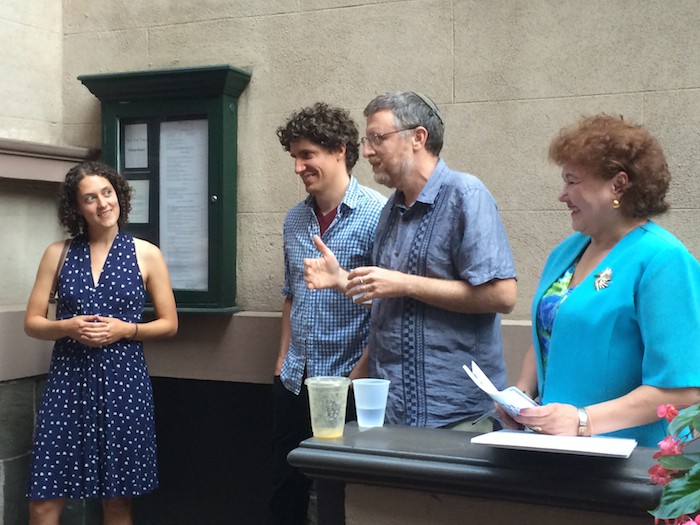
Not too many months ago, Paul Bass gave serious thought to shutting down the New Haven Independent, the online-only nonprofit news site he founded in 2005.
“A while back, I considered whether I still had the energy to keep going,” Bass said. “I was burnt.”
He decided to keep it alive. And now he’s getting ready to relaunch with two new full-time staff reporters — one who will start the day after Labor Day, the other who has yet to be hired.
For a small community news organization, the Independent has been remarkably stable. Last week, Bass threw a going-away party for managing editor Melissa Bailey, who will be a Nieman Fellow starting this fall, and staff writer Thomas MacMillan, who is moving to New York to seek his fame and fortune. Both began working at the site as it was ramping up, Bailey in 2006 and MacMillan the following year. (The fourth staff member, Allan Appel, recently cut back to a part-time position.)
Several hundred people gathered in and outside the Woodland Café, near the New Haven Green, to say goodbye to Bailey and MacMillan. Their photography was on display, accompanied by QR codes that smartphone users could access to take them to the stories where those photos first appeared. Copies of Bailey’s just-published book on education reform in New Haven, School Reform City: Voices from an American Experiment, were on sale, along with Appel’s novel The Midland Kid: Tales of the Presidential Ghostwriter. Mayors past (John DeStefano) and present (Toni Harp) were on hand, as were a number of other community leaders.
“It’s really hard for me to imagine leaving New Haven for more than a few days, let alone a whole year,” Bailey told the crowd. MacMillan defined the privilege of being a journalist: “You ask questions and people just open up to you and give you these amazing stories.”
When I met with Bass afterwards, he talked about how difficult it would be to replace the two. “They’re community journalists. They love the work. They grew so much,” he said. “They both learned so many things, and they really ran the operation with me.”
Yet their departure will allow him to solve a longstanding problem: having an all-white staff cover a city where African-Americans and Latinos are in the majority. “The people I’m hiring will diversify the staff racially,” Bass told me. The Independent has used minority freelancers and interns, but all of its full-time staff journalists have been white.
The reboot of the Independent comes at a crucial time. The regional daily paper, the New Haven Register, has gone through several rounds of cuts in recent months — including one announced just last week — as its owner, Digital First Media, prepares for a widely predicted sell-off. In a few years, Digital First has gone from a closely watched experiment in reinvention to just another sad tale of chain journalism gone wrong.Thus the Independent’s mix of political and neighborhood news, education reporting, and, increasingly, a focus on the arts fills a real need.
Despite the challenges of keeping a nonprofit going, Bass has had quite a bit of success with fundraising. Currently, he said, he has pledges through 2015 to cover the $420,000 budget for the Independent and a satellite two-person site in the northwest suburbs called the Valley Independent Sentinel. In recent years, he added, his fundraising base has shifted from about 75 percent foundation grants to about 25 percent. Most of the money comes from high-net-worth donors in the New Haven area. About $15,000 to $20,000 comes from small donors.
Late in 2013, Bass applied for a low-power FM license to operate a nonprofit community radio station in New Haven. He has yet to hear from the FCC, but he continues to hope it will come through. “I think we’d engage the readership in a new way,” he said.For now, though, he’s planning to do something he’s never done before: ramp down the Independent for a few weeks. Posting will be minimal this week and next. And he’s going to stop posting completely during the last two weeks of August — a first since the Independent began publication in late August of 2005. Then comes the new Independent.
“I’m not going to have the same experience level I have now, so it’s going to be different,” Bass said. “I don’t think I can replace Thomas and Melissa.”
Dan Kennedy is an associate professor of journalism at Northeastern University and a panelist on Beat the Press, a weekly media program on WGBH-TV Boston. His blog, Media Nation, is online at dankennedy.net. His most recent book, The Wired City: Reimagining Journalism and Civic Life in the Post-Newspaper Age (University of Massachusetts Press, 2013), tracks the rise of the New Haven Independent and other online community news projects.